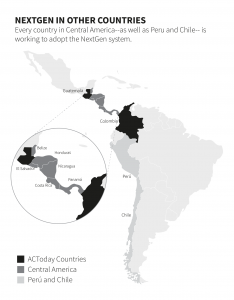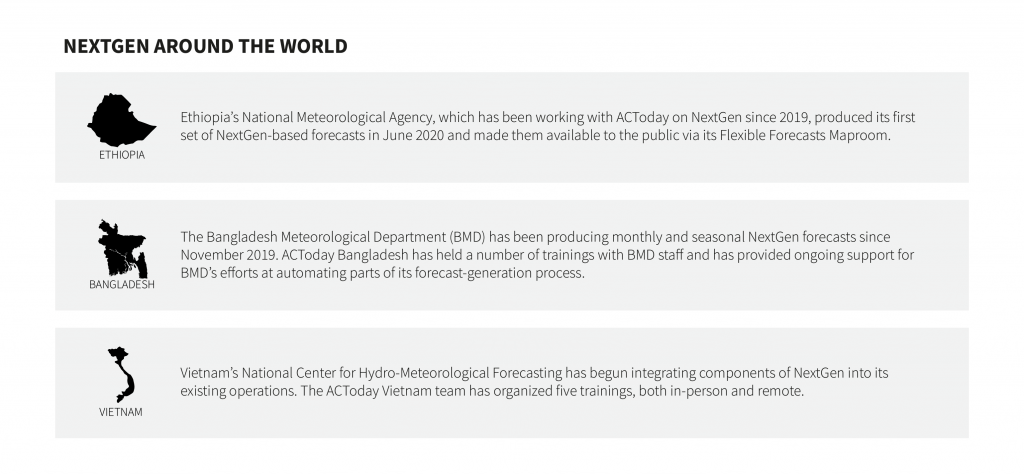2021 ACToday Report: From Two Countries to Ten: A Region Receives Powerful Climate Forecasting Boost
This story was published as part of the Adapting Agriculture to Climate Today, for Tomorrow (ACToday) Columbia World Project 2021 Report. Read the full report here.

ACToday has worked with the national governments of all six countries where the project operates to design and deploy a state-of-the-art forecasting system known as NextGen. In 2019, NextGen was launched in Colombia and Guatemala. The new forecast approach gave the two countries a significant upgrade to their climate prediction capabilities almost overnight, and has enabled the development of more sophisticated decision-support systems, including mapping tools, for agriculture and food-security planning.
Neighboring countries have paid attention to ACToday’s successes in Colombia and Guatemala, leading to an exciting development in 2020: Every country in Central America,as well as Peru and Chile,is working to adopt the NextGen system.
“Food security transcends boundaries,it doesn’t recognize national borders,” said Ángel G. Muñoz, the ACToday country lead for Colombia and Guatemala. “So when we improve the capability of an entire region to monitor and forecast climate conditions that could impact food production, storage, transport and trade, all the countries, and the 150 million people who live in them, benefit.”
The decision to implement NextGen in these new countries came after a meeting of the Board of Directors of the Central American Regional Committee of Hydrological Resources (CRRH), said Muñoz. The directors of the region’s seven national meteorological services make up the board.
“ACToday was invited to present NextGen to CRRH, and when we showed them the system’s forecasting and verification capabilities, one-by-one, each country gave us the green light to implement it,” he said.
“We’re proud to see how the Central American meteorological services are implementing NextGen using a regional approach rather than a country-by-country one,” said Berta Olmedo, CRRH’s executive secretary. “These countries share similar demands for food security, similar expertise and resources, and similar climate risks. The NextGen system enables them to take advantage of each other’s experience to develop a state-of-the-art regional system that provides tailored information at national and subnational levels.”
“When we improve the capability of an entire region to monitor and forecast climate conditions that could impact food production, storage, transport and trade, all the countries, and the 150 million people who live in them, benefit.”
Ángel Muñoz, IRI
Despite the COVID-19 pandemic, ACToday has continued its work, conducting a set of virtual NextGen trainings for each country’s national meteorological service. Staff from INSIVUMEH, Guatemala’s meteorological service and a key ACToday partner, are leading the training sessions, which include representatives from all the participating countries.
“They’re learning the fundamentals together, sharing ideas and working through decisions and problems as a team, and for the whole region, independently of the country they are from,” said Muñoz. “We consider this an important step in building a strong, long-lasting NextGen community in the region.”
International Attention

ACToday’s work in Latin America has also generated interest at the World Meteorological Organization (WMO).
“NextGen has an incredibly flexible approach for producing spatially-detailed and seamless predictions at timescales of weeks to years,” said Wilfran Moufouma-Okia, the head of WMO’s Regional Climate Prediction Services Division. “It provides new avenues for delivering high-quality climate information, products and services that benefit decision makers.”
WMO is supporting the expansion of NextGen into Chile and Peru through its existing climate services project called ENANDES, which aims to increase the adaptive capacity of highly vulnerable Andean communities in these two countries and in Colombia. Moufouma-Okia said the decision came after he and his WMO colleagues saw the positive impacts of ACToday’s collaboration with IDEAM, Colombia’s national meteorological service.
“NextGen has an incredibly flexible approach…that provides new avenues for delivering high-quality climate information, products and services that benefit decision makers.”
Wilfran Moufouma-Okia, WMO
“What’s really exciting is that as more countries implement NextGen, we’re helping change the way individual national meteorological services work because we’re able to take a regional approach to training and collaboration,” said Muñoz.
“Advances in one country often end up informing and guiding the trajectory of one or more of its neighbors through technical cooperation and knowledge sharing across countries in the Southern Hemisphere, he said.


You must be logged in to post a comment.